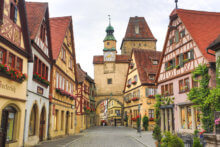Order and History in Bavaria

Let me give you a brief summary of some of what I heard at the conference on “Eric Voegelin: Ordnung und Geschichte” at the Catholic Academy in Bavaria, January 29, 2011.
The speakers were Hans Maier, one-time professor at the Institute Voegelin founded, later Minister of Culture in Bavaria, and Professor emeritus of the University (his last post having to do with Christian Philosophy); Peter J.Opitz, whose work you are familiar with; and Michael Henkel, Private Dozent for Political Science at the University of Leipzig, a younger scholar who has written about Staatslehre.
Mr. Maier, who had once had his conflicts with Voegelin, had been asked to go over the history of Voegelin’s time in Munich. Voegelin, according to Mr. Maier, did not think enough about preparing the secondary teachers, and other “multipliers,” but was too focused on educating a scholarly elite.
In general, he thought Voegelin was unsuited for the everyday workings of political science: teaching people about voting laws, institutions, and the rest, and was almost exclusively concerned with the deeper issues upon which society is of, course, based but which political science cannot deal with exclusively. In other words, Voegelin was right, but he was also wrong.
Mr. Opitz had been asked to give an overview of Voegelin’s scholarly development. He demonstrated how Voegelin had deepened his original insights, which were made pretty early in his career, concerning the cognitive and existential basis of science. He emphasized Voegelin’s search for the Ground, the symbols of that experience, and the centrality such experience plays in the order of the soul and society. He also pointed out that Voegelin’s work was an attempt to respond to the “modern crisis” of the loss of spiritual orientation.
Mr. Henkel was asked to talk about the reception of Eric Voegelin in political science in Germany. He pointed out that in the 1960’s political science was seen in “political terms in Germany. The so-called Critical-Rationalists were associated with the Liberal Party, the Frankfurter School (and other Neo-Marxists) were associated with the Left, and the Normative-Ontological School was considered to be part of the Conservative, Christian Party.
Voegelin’s criticism of all of these positions left him without solid political ground to stand on, and contributed to his isolation. Also, when Voegelin came to Germany in 1958 there were only two articles by him in German. Both Maier and Henkel also pointed to the problem of the exile who was confronted with the fact that some of the younger men who had gone along with the Nazis were now in positions of power and influence at the university. This also contributed to the underlying tension.
While conceding that academic political science is based on philosophy, Henkel pointed out that it has many other tasks. Voegelin’s approach to fundamentals will always be a critical instance and individuals will learn from it, but he did not see Voegelin ever being at the center of political science in Germany. He noted that in recent years there has been a revival of interest in the theme of political religions, but felt that in regard to this issue Voegelin is read in a one-sided manner. It is the criticism of totalitarianism that is discussed — but his criticism of other aspects of modernity that have not quite reached the boiling point of totalitarianism, yet are against the spirit — are not considered. Henkel saw some evidence that the increasing discussion of cross-cultural politics, or “the clash of civilizations” would lead more people to read Voegelin.
The conference was well attended. Some of those who came, now up in years, had heard Voegelin lecture half a century ago. There was the usual for and against. I would say that those who valued Voegelin were people who were concerned with philosophy, or religion, or who had been teachers in secondary schools. Those who had become lawyers in the state administration seemed a bit impervious to the notion of the “Revolution of the Spirit” that Voegelin lectured about in Hitler and The Germans and in ”The German University During the Third Reich.” However these two lectures were the most prominently mentioned texts of Voegelin’s during this conference, both by people asking questions and by the speakers. Also the text “What is Political Reality” was referred to by more than one speaker.
The German books and pamphlets on display–primary and secondary works–were met with interest, and I am told that several people made inquiries concerning the Eric-Voegelin-Gesellschaft e.V.
I talked to a few students and to a few retirees; it was a pleasant and instructive day.
So much for the latest “Voegelin news” from this part of the world!




